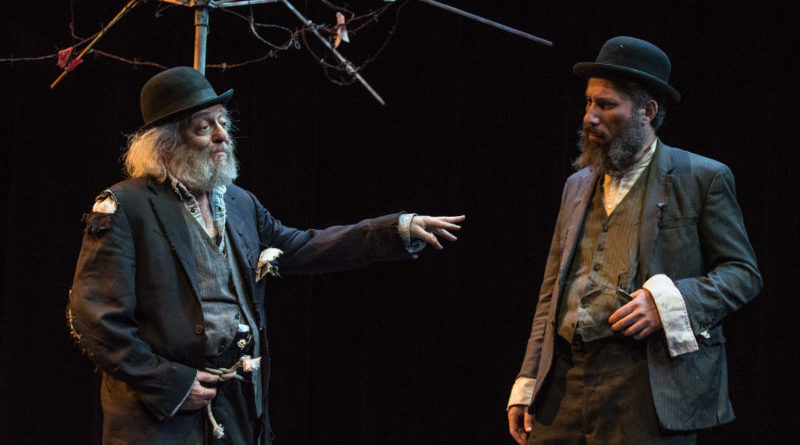INTERVIEW: New Yiddish Rep revives ‘Waiting for Godot’
Photo: From left, David Mandelbaum and Eli Rosen star in New Yiddish Rep’s production of Waiting for Godot. Photo courtesy of Dina Raketa / Provided by Kampfire PR with permission.
New Yiddish Rep has turned a fresh perspective on one of the most famous plays of the 20th century. Their Yiddish-language production of Samuel Beckett’s Waiting for Godot continues through Jan. 27 at The Theater at the 14th Street Y in New York City. Directed by Ronit Muszkatblit and translated by Shane Baker, the production offers an existential response to the refugee crisis in the world.
The cast of the show includes David Mandelbaum, Eli Rosen, Gera Sandler, Richard Saudek, Noam Sandler and Myron Tregubov. For those who don’t speak Yiddish, English supertitles are broadcast above the stage.
Recently Hollywood Soapbox exchanged emails with Muszkatblit about the production. She serves as artistic director of arts and culture for The Theater at the 14th Street Y. Questions and answers have been slightly edited for style.
What originally inspired this production?
As I have only been part of the second iteration of this translation I can speak to why I was inspired to be part of this production. The play has always been one that I wanted to work on and bring to the contemporary sphere; the questions in the play and the world around us have just grown closer and more poignant with time. Yiddish opens more doors in my soul and heart, and these characters seem to be drawn from the literary depths of Yiddish and its world.
Has the company found new angles and depth to the play with its new translation?
Definitely. Because it is being performed in Yiddish with a contemporary commentary on the refugee situation — throughout the world and on the American border — the depth and relevance of the play are accentuated. It does this in a way by removing us with an ancient language.
What are your memories of first encountering the work of Samuel Beckett?
Scene study class at The Actors Studio Drama School where I did my MFA in directing. As I was already one of the older international students, growing up in Germany and Israel, going through the army and being the daughter of a Holocaust survivor, I tried to capture the tragedy and comedy in my actors work on one of the shoe / carrot scenes. The chasm of experiences was very real to me at that point. In this production I feel that we all share a similar migrant and age DNA, and it was much clearer to us even without explaining much, we all felt it in our kishkes (intestines) in Yiddish.
Why is this play so timely right now?
In an abstract foggy world we can much louder call attention to the existential crisis 68.5 million people in the world are facing today.
How has it been working with this ensemble of actors?
This is a fabulous team; you know you have found your people when there [are] very few words used [and] each brush stroke of a proposal feels as if it was always there as part of the given world.
The ensemble had to learn to be part of an endless repetitive world, and they have been incredibly giving. For example, six days before our first performance we had to replace Vladimir — one of the lead roles in the play. Eli Rosen deep dived into the role and learned the whole play in two days, which in itself is the craziest thing I have ever experienced. Godot is extremely wordy, but not only did he learn the text, he became Vladimir and embodied a whole new and crucial version of this dialogue. You have to come experience it because it is mastery in existence.
The designers were also extremely inspired and on the same page as I was from the beginning. Scenic and costume designer George Xenos had created the same photo guide as I had; it was great to see we both had the same references at that first production meeting. Images from the Island of Lesbos and refugee camps, and sound designer Moshe Lobel ran with these and created an opening documentary sound collage and infused the rest of the world with echoes of soul and dream. Our lighting designer, Reza Behjat, was also extremely observant and sensitive. It was wonderful to see him at rehearsals understanding the musical rhythms of the language and blocking and translating that into his design.
Trust is the most valuable asset when working with a team, and giving them space to create is based on this trust. We all crafted a world together where the whole became Godot as the sum of all parts vibrated in the same frequency.
By John Soltes / Publisher / John@HollywoodSoapbox.com
Waiting for Godot by the New Yiddish Rep continues through Jan. 27 at The Theater at the 14th Street Y in New York City. Click here for more information and tickets.

